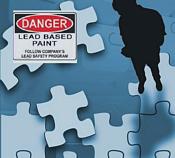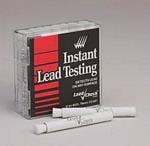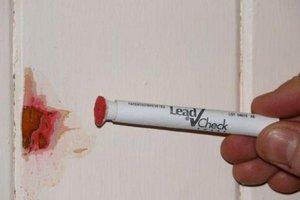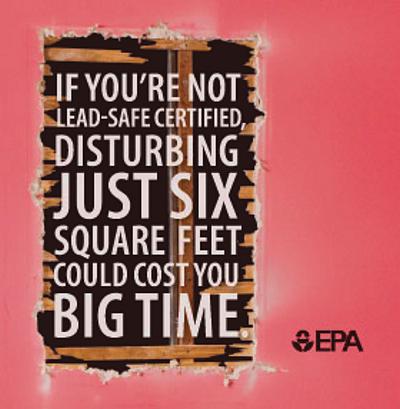EPA Announces More Lead Paint Violation Fines; This Time Against Landlords
Seems EPA has started their publicity campaign regarding enforcement of RRP and other lead related regulations. This one is not RRP specific, but as the second violation announcement this week it certainly seems to demonstrate that EPA is using enforcement and press releases to get their message out about compliance with lead paint requirements.
News Release
U.S. Environmental Protection Agency
New England Regional Office
April 11, 2012
Contact: Paula Ballentine, 617-918-1027
Conn. And Mass. Based Landlords Face Fines for Failing to Notify Tenants about Lead Paint
(Boston, Mass. – April 11, 2012) The owners of rental properties in Bridgeport, Conn. as well as South Boston, Roxbury, and Dorchester, Mass., face EPA penalties for violating federal lead paint disclosure rules. In both cases, these violations potentially put tenants at risk of exposure to lead hazards.
According to a complaint filed by EPA’s New England office, Juan Hernandez allegedly violated lead-based paint disclosure requirements seven times when he rented apartment units in Bridgeport, Conn. between 2008 and 2010. Mr. Hernandez faces an EPA penalty of up to $127,150 for violating federal lead paint disclosure rules. During the time period relevant to EPA’s investigation, all of the apartment buildings owned by Mr. Hernandez were located in potential environmental justice areas.
In a separate EPA complaint, Edward Franco, owner of El Paso Management, and its affiliates allegedly violated lead-based paint disclosure requirements when they rented apartment units three times in South Boston, Roxbury, and Dorchester in 2009. Most of the tenants involved in this case live in low income and/or minority areas.
Both parties are charged with failing to give tenants required lead hazard information pamphlets, failing to include lead warning statements in leases, failing to disclose any known lead-based paint or lead-based paint hazards, and/or failing to provide records or reports pertaining to lead-based paint or lead-based paint hazards.
Federal lead disclosure rules are meant to give tenants adequate information about the risks associated with lead paint so that they can make informed decisions before signing a lease contract. Property owners leasing housing built before 1978 are required to provide the following information to tenants: the EPA-approved lead hazard information pamphlet, Protect Your Family from Lead in Your Home; a lead warning statement; statements disclosing any known lead-based paint and/or lead-based paint hazards; and copies of all available records or reports regarding lead-based paint and lead-based paint hazards. This information must be provided to tenants before they enter into leases.
Infants and young children are especially vulnerable to lead paint exposure, which can cause developmental impairment, reading and learning disabilities, impaired hearing, reduced attention span, hyperactivity and behavioral problems. Adults with high lead levels can suffer difficulties during pregnancy, high blood pressure, nerve disorders, memory problems and muscle and joint pain.
More information:
Lead-based paint health hazards (www.epa.gov/ne/eco/ne_lead/index.html)
Lead-based paint disclosure rule (www.epa.gov/ne/enforcement/leadpaint/index.html)
Click here for more RRPedia blog posts for landlords.
Shawn is available to help landlords with the RRP Rule. If you are a landlord or belong to a landlord association that is seeking assistance with the RRP rule, contact Shawn today to discuss how he can help.

 Looking for accurate information about the EPA RRP rule?
Looking for accurate information about the EPA RRP rule? 






 With spring only a short time away, contractors will soon be working outdoors again in the northeast. This will make the work they do and the work practices they use much more visible to OSHA and EPA. Consider yourself warned and get ready. In additional to the work practices required under RRP rules, there are plenty of OSHA regulations and requirements as well. If you don’t have written safety plans for the work your business performs, or if you have not provided the required safety training and equipment for your workers, you might become an easy target.
With spring only a short time away, contractors will soon be working outdoors again in the northeast. This will make the work they do and the work practices they use much more visible to OSHA and EPA. Consider yourself warned and get ready. In additional to the work practices required under RRP rules, there are plenty of OSHA regulations and requirements as well. If you don’t have written safety plans for the work your business performs, or if you have not provided the required safety training and equipment for your workers, you might become an easy target.  The press release below explains how the violator was investigated after a YouTube video of the the renovator's workers in action was posted showing the total lack of lead-safe work practices in place as the workers used power equipment to remove paint on a rental property on Rockland ME.
The press release below explains how the violator was investigated after a YouTube video of the the renovator's workers in action was posted showing the total lack of lead-safe work practices in place as the workers used power equipment to remove paint on a rental property on Rockland ME.  Will this be the first of many press releases by EPA regarding enforcement? Many contractors who have complied with the RRP rule hope so. According to Curt Spalding, regional administrator of EPA’s New England office: "Enforcement of these rules is important to protecting children and the business interests of those contractors who are following the rules.”
Will this be the first of many press releases by EPA regarding enforcement? Many contractors who have complied with the RRP rule hope so. According to Curt Spalding, regional administrator of EPA’s New England office: "Enforcement of these rules is important to protecting children and the business interests of those contractors who are following the rules.” 
 Through my fellow NARI member contacts I have learned that on November 5, 2010, at their offices in Washington DC, the
Through my fellow NARI member contacts I have learned that on November 5, 2010, at their offices in Washington DC, the  Hybrivet Systems, Inc. and ESCA Tech, Inc. are the manufacturers of the only two commercially available
Hybrivet Systems, Inc. and ESCA Tech, Inc. are the manufacturers of the only two commercially available  At the meeting a representative from ESCA Tech, Inc asked the EPA when it was going to require that RRP training instructors demonstrate the proper use of both of the currently approved lead test kits at the EPA required Certified Renovator Training Classes. EPA responded that they were not going to require training on both kits and instructors could decide which kit they would demonstrate at the training.
At the meeting a representative from ESCA Tech, Inc asked the EPA when it was going to require that RRP training instructors demonstrate the proper use of both of the currently approved lead test kits at the EPA required Certified Renovator Training Classes. EPA responded that they were not going to require training on both kits and instructors could decide which kit they would demonstrate at the training.  Here is just one reason I will go with the Lead Check kits when I do RRP training. Using the D-Lead kits will definitely take longer than using the Lead Check kits. The certified renovator classes at eight hours long make for a long day and it is tough enough already for instructors to cover the subject matter in those eight hours. Demonstrating and using the D-Lead kits would either cause the class to go past eight hours, or time spent on other topics would need to be cut back to keep the day at eight hours. I know the students would rather not extend the day and I would prefer not to cut back on or eliminate any of the required subject matter.
Here is just one reason I will go with the Lead Check kits when I do RRP training. Using the D-Lead kits will definitely take longer than using the Lead Check kits. The certified renovator classes at eight hours long make for a long day and it is tough enough already for instructors to cover the subject matter in those eight hours. Demonstrating and using the D-Lead kits would either cause the class to go past eight hours, or time spent on other topics would need to be cut back to keep the day at eight hours. I know the students would rather not extend the day and I would prefer not to cut back on or eliminate any of the required subject matter. The EPA sent out the press release below to announce National Lead Poisoning Prevention Week. Although the announcement mentions the RRP Rule and that contractor training and certification are required, it certainly falls short in giving consumers sound advice about having renovations done at their homes. Earlier this year many in the industry expressed this same concern about the
The EPA sent out the press release below to announce National Lead Poisoning Prevention Week. Although the announcement mentions the RRP Rule and that contractor training and certification are required, it certainly falls short in giving consumers sound advice about having renovations done at their homes. Earlier this year many in the industry expressed this same concern about the  Legitimate businesses have been demanding that EPA enforce the rule and go after illegally operating renovators. This announcement could have assisted in that effort. Had the announcement encouraged consumers to check for and report violators of the rule perhaps we could protect more children. In effect, by not adequately enforcing this rule, the gap between legitimate businesses and the underground economy is widening.
Legitimate businesses have been demanding that EPA enforce the rule and go after illegally operating renovators. This announcement could have assisted in that effort. Had the announcement encouraged consumers to check for and report violators of the rule perhaps we could protect more children. In effect, by not adequately enforcing this rule, the gap between legitimate businesses and the underground economy is widening. 


